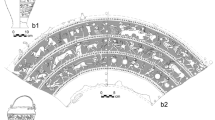Abstract
We didn’t have writers, but we did have music, and the music was the vehicle to carry the remnants of Black history. The true history of Blacks is not in our history books, but in the music. The only blacks I ever heard of in school were Booker T. Washington and George Washington Carver. It was like nobody else existed. We had no folk heroes in books, ever. Our history is all locked in the music and is passed down in its different forms through that music.
Similar content being viewed by others
Notes
Quoted inDownbeat, October 23, 1975.
Mack H. Jones and Alex Willingham, “The White Custodians of the Black Experience,”Social Science Quarterly, June 1970.
The list of artists were compiled from articles and advertisements inBlack Collegian, Black Enterprise, Downbeat, andEssence.
“The Top 100,”Black Enterprise, June 1977.
For Motown’s response to the alleged link with the Mafia, see “We Try To Get Our Eye on the Objective and then Go Get It,”Black Enterprise, June 1974, p. 88.
Lester Carson, “Black Directors,”Black Enterprise, September 1973, p. 17.
Ibid.
Ibid., p. 19.
Ibid., p. 28.
Ossie Davis finds the same to be true with the black movie industry. See his “The Power of Black Movies,”Freedomways, (Vol. 14, No. 3) 1974, pp. 230-232.
Martin H. Seiden,Who Controls the Mass Media? (NY: Basic Books, 1974), p. 46.
See in particular his article, “Black Music: Sound and Feeling for Black Liberation,”Black Scholar (Jan.–Feb. 1976) pp. 20-25.
Ibid., p. 24.
Diane Weathers, “Managing the Muses,”Black Enterprise, Dec. 1976, p. 23.
Ibid., p. 26.
William M. McClendon, “Black Music . . .” op. cit., p. 20.
Stanley Aronowitz, False Promises (NY: McGraw Hill, 1975) pp. 122–123. $
About this article
Cite this article
Cooper, A.D. A note on the economic control of black popular music. Rev Black Polit Econ 9, 441–451 (1979). https://doi.org/10.1007/BF02891733
Issue Date:
DOI: https://doi.org/10.1007/BF02891733




